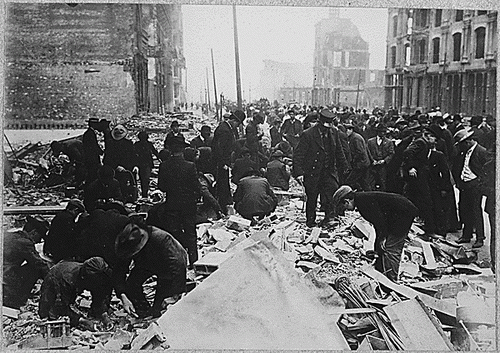Historical Importance of the 1906 San Francisco Earthquake:
Scientific study of the 1906 San Francisco earthquake led to the formation of the elastic-rebound theory, which helps explain why earthquakes occur. The 1906 San Francisco earthquake was also the first large, natural disaster whose damage was recorded by photography.

Dates:
5:12 a.m. on April 18, 1906
Also Known As:
The Great Quake and Fire; The Great Shake; The Great San Francisco Earthquake
Overview of the 1906 San Francisco Earthquake:
At 5:12 a.m. on April 18, 1906, a foreshock hit San Francisco. However, it offered just a quick warning, for massive devastation was soon to follow. Approximately 20 to 25 seconds after the foreshock, the large quake hit. With the epicenter near San Francisco, the entire city was rocked. Chimneys fell, walls caved in, and gas lines broke. Asphalt that covered the streets buckled and piled up. Many people didn’t have time to even get out of bed before they were killed by falling debris.The earthquake lasted for approximately 40 to 60 seconds. Almost immediately, fires broke out across the city from broken gas lines and stoves that had fallen over during the shaking. The fires spread ferociously across San Francisco. Unfortunately, most of the water mains had also broken during the quake and the fire chief was an early victim of falling debris. Without water and without leadership, it’s amazing the city was able to get the fires under control in just four days. However, massive amounts of damage had already been done.
The quake and subsequent fire left more than half San Francisco’s population homeless, destroyed 28,000 buildings, and killed approximately 700 to 3,000 people.
The quake ruptured a total of 290 miles of the earth’s surface along the San Andreas Fault, from northwest of San Juan Bautista to the triple junction at Cape Mendocino. Though most of the damage was focused in San Francisco (a large part because of the fires), the quake was felt all the way from Oregon to Los Angeles.
Scientists are still trying to accurately calculate the magnitude of the quake. Since the scientific instruments used to measure the earthquake weren’t as reliable as more modern ones, scientists have yet to agree on the size of the magnitude, but most place it between 7.7 and 7.9 on the Richter scale (a few have said as high as 8.3).
